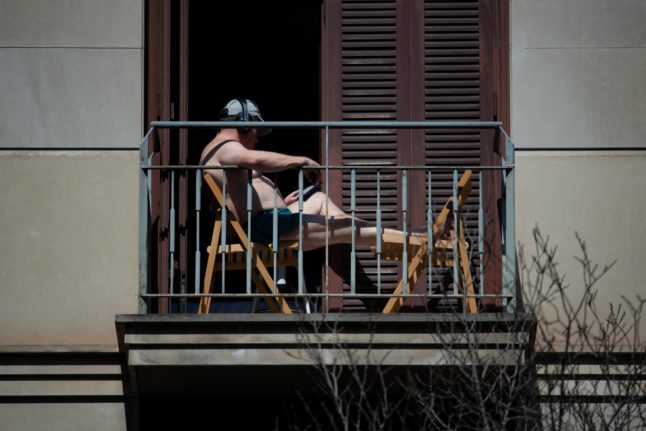Imagine the scene: you’ve just bought or signed the lease on your dream apartment. It’s bright and airy, with plenty of space, and even has a nice-sized balcony to get some fresh air on. You can do whatever you want there, right?
Not exactly. In Spain the rules on what you can and can’t do on a balcony (even if it’s private) depend on a few factors, namely the regional and local rules, as well as getting the approval of the building’s homeowner’s association – known in Spain as la comunidad.
Some of them might just surprise you.
READ ALSO: ‘La comunidad’: What property owners in Spain need to know about homeowners’ associations
There are four main things or activities on balconies that could potentially put you on the wrong side of the local rules and even get you fined: barbecues, plants, laundry, and flags.
In all cases (even if you don’t think you’re breaking any rules) you’ll generally need to consider two things: firstly, does this affect or change the building’s façade? And secondly: will la comunidad allow it?
Barbecues
In Spain there is no national law prohibiting barbecues on private property, so in principle it is legal as long as the barbecue is lit in a private space such as your own balcony, garden or terrace, and not a shared space.
Often in Spain, the roof (usually referred to as la terrazza) is a shared space people use for storage and hanging their laundry, so be sure to check with the comunidad.
In terms of your own balcony, however, although there’s no law saying outright you can’t have a barbecue, you’ll need to take into account the rules and regulations in force in each locality or region. There may also be specific rules within the building that long-term homeowners have developed over the years.
As we will see, many of these low-level regulations are delegated to local governments and town halls in Spain, so the answer to these sorts of questions is usually: it depends where you are.
However, according to Article 7 of Spain’s Horizontal Property Law, “the owner and the occupant of the flat or premises are not allowed to carry out in it or in the rest of the property activities prohibited in bylaws, which are harmful to the property or which contravene the general provisions on annoying, unhealthy, harmful, dangerous or illegal activities.”
This basically gives your neighbours the right to complain about noise, smells, smoke and any possible fire risk in or around their building, which barbecues could plausibly fall under.
As with co-living anywhere in the world, regardless of the regional or local rules, employ some common sense: be reasonable, listen to neighbour’s concerns and take up any disputes with the President of la comunidad.
READ ALSO: What you need to know before having a barbecue in Spain
Plants
Again, with plants the responsibility falls on each local authority to set the rules. In Spain, most regions and town halls state that, as long as the architectural or structural elements of the building are not changed or weakened in any way, putting plants on your balcony is permitted.
However, note that many terraces and balconies do have maximum weight regulations that must be respected in order to guarantee their safety, which is 200kg per square metre. If this figure is exceeded (and it can be proved) you could theoretically be fined.
Laundry
Laundry lines criss-crossing the streets might be one of the more picturesque images of Spanish life, but the people doing it might actually be breaking the rules.
How do you know? You guessed it, it depends where you. You’ll need to check with your local authority on this one, though municipal regulations in Barcelona, Madrid and Valencia all regulate hanging laundry from your balcony, which is again outlined in the Horizontal Property Law.
This principally seems to be because it affects the façade of the building (a common theme when it comes to balcony rules in Spain).
In places with rules about hanging laundry from balconies, you could be fined up to 750 euros if you don’t comply with the rules.
However, according to Foto Casa, even if you live in an area where there are no bans or penalties against hanging laundry on the balcony, you’ll still likely need the permission of la comunidad.
READ MORE: Spain’s weirdest laws that foreigners should know about
What about flags?
Whether it be the Spanish flag, the Catalan, Valencian or Andalusian flags, or LGBT, trade union or football team flags, flags proudly hanging from balconies is another mainstay of Spanish life.
It’s also one of the more controversial ones too, especially within comunidad meetings. Hanging flags on the balcony, as well as allegedly altering the aesthetics and security of the building (the same concern as with laundry) often has ideological connotations that can cause conflict.
Again, as with laundry, hanging flags on the balcony will require the approval of all the owners within the community, something that must be agreed at a meeting, as per the Horizontal Property Law.
However, if the flag is placed inside the property, as it is a private property, fellow homeowners cannot oppose it, even if it is visible from the street, according to Foto Casa.
Nudity
Article of 185 of Spain’s Penal Code only considers being naked at home to be obscene exhibitionism and sexual provocation if it affects minors, in which case it is punishable with a fine or up to a year in prison.
Therefore, you could technically sunbathe shirtless or naked on your balcony in most cases without getting into trouble, although it won’t necessarily go down well with your neighbours and/or flatmates and you be reprimanded for it.
READ ALSO: Can you go shirtless or wear a bikini in the street in Spain?



 Please whitelist us to continue reading.
Please whitelist us to continue reading.
Member comments